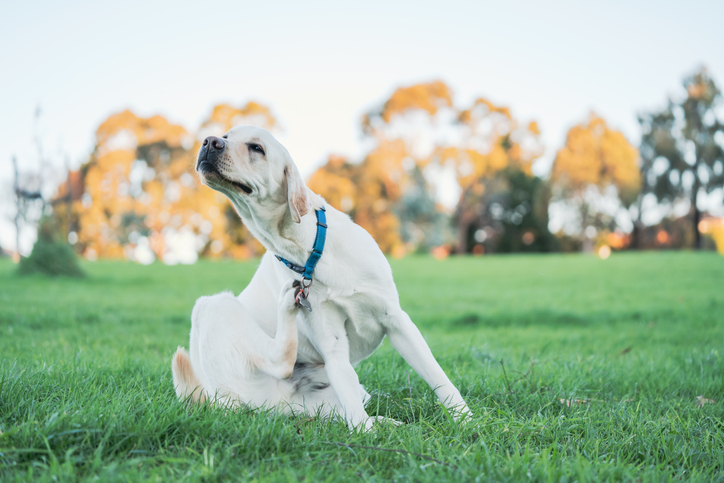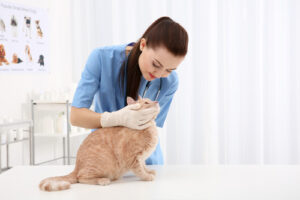Do you think your dog has allergies? Allergies are surprisingly common in dogs, and there are many types of allergies to be on the lookout for, as well. If you suspect your dog could be dealing with allergies, it’s important to narrow down the possible causes and make changes in your dog’s routine as needed.
In our Colorado Springs, CO, animal hospital‘s article, you’ll find more information about the most common types of canine allergies and what causes them. You’ll also learn which symptoms to look for so you can recognize this problem in your pet before it gets out of hand.
Types of Canine Allergies
Food Allergy
A food allergy is the most common type of allergy in dogs. Dogs who eat food they can’t tolerate may experience a variety of skin and coat problems as a result. You can remedy this issue by simply changing your dog’s food to something with healthier, better-quality ingredients and a different protein source in most instances.
Pollen Allergy
Pollen allergies typically occur during specific times of the year when pollen counts are unusually high. They may also be referred to as seasonal allergies. These allergies typically come and go, and they may flare up when more plants begin growing and blooming in your dog’s environment during spring and summer.
Contact Allergy
Contact allergies occur when dogs come into physical contact with an allergen. For example, if your dog is allergic to poison ivy and walks through a patch of it while outside, she may break out in hives or experience other allergic responses from this contact.
Odor and Smoke Allergy
Some dogs are allergic to or intolerant of smoke and odors in their environment. Candles, scented fragrance plug-ins, potpourri, cigarettes, and other similar environmental factors can contribute to allergic responses in dogs who are very sensitive to them. Try your best to remove these sources from your dog’s environment whenever possible.
Medication Allergy
Some dogs may have allergies to their medications. This can be a dangerous type of allergy, as it may build up slowly in a dog’s system over time before expressing itself as a serious allergic response. Go to the vet right away if you think your dog may be allergic to her medication. Never give a dog human medication unless told to do so by your vet.
Symptoms of Canine Allergies
Hair Loss and Poor Skin Health
Skin and coat issues are the most common symptoms of food allergy in dogs. You can typically recognize a food allergy if your dog starts losing her hair suddenly or experiencing dandruff and other skin issues.
Sneezing and Wheezing
Sneezing and wheezing occur with pollen allergies as well as odor and smoke allergies. Some dogs may even have these symptoms with food allergies, although this is much less common. If your dog is having respiratory symptoms from an allergen, talk to your vet about allergy medication options.
Runny Nose and Watery Eyes
Runny nose and watery eyes happen as a result of odor and smoke allergies, pollen allergies, and some contact allergies, depending on the source. These symptoms also indicate that you should talk to your vet about your dog’s best options for managing her allergies.
Hacking Cough
A hacking cough can mean allergies, but it may also be associated with kennel cough, heartworm disease, and other issues as well. If your dog’s only symptom is a hacking cough, talk to your vet and have your pet officially diagnosed before assuming the underlying cause is allergies.
Upset Stomach
An upset stomach can be caused by food allergies, contact allergies, and medication allergies. Rarely, other types of allergies can also contribute to an upset stomach. Pets who have an upset stomach from allergies may need to be on medication, but if the underlying cause is a food allergy, you can usually resolve the issue by simply changing your dog’s diet.
Hives
Hives occur when pets have allergies that affect the body’s response to the allergen. Hives are typically a sign of a moderate to severe allergic response, and they should be a slight cause for concern. Although you don’t have to rush your pet to the emergency vet for hives, you should pay close attention for signs of an anaphylactic reaction.
Schedule an Allergy Exam with Our Colorado Springs, CO, Animal Hospital
As you can see, there are many potential causes of allergies in dogs. It’s a good idea to learn how to recognize the signs and symptoms of canine allergies so you know when to talk to your vet for more information.
If you suspect allergies in your dog, your vet can be a valuable resource to help you determine which allergies are causing the issue. Additionally, your vet can prescribe medication as needed and help your dog feel better fast.
To schedule your cat’s allergy exam, give our Colorado Springs, CO, animal hospital a call at (719) 475-1314.





